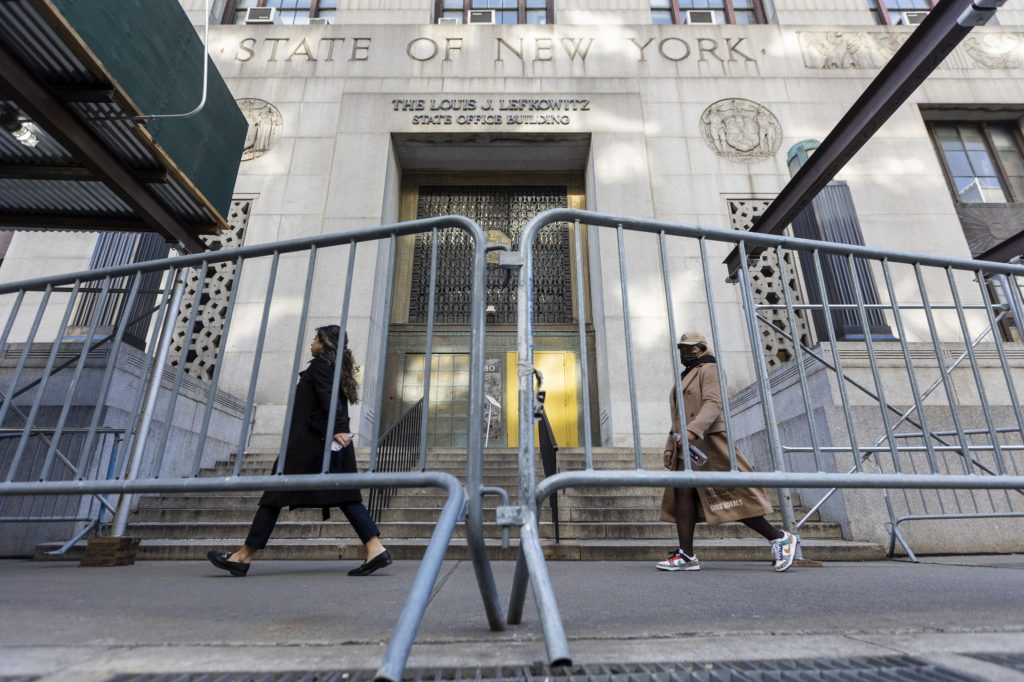The New York state grand jury weighing criminal charges against Donald Trump over alleged hush money payments is expected to hear at least one witness on Thursday, as it appears to near the end of its inquiry.
The grand jury’s Wednesday session was canceled after prosecutors in Manhattan District Attorney Alvin Bragg’s office alerted court officials to the adjournment, said a person familiar with the matter, who spoke on the condition of anonymity since it isn’t public. The jurors, who are examining payments to porn star Stormy Daniels during the 2016 election, are to return Thursday afternoon.
No reason was given for Wednesday’s adjournment, but former federal prosecutor Harry Sandick, now in private practice, said Bragg may be taking a moment to reflect.
“It is possible that the DA’s office may want more time to think things through,” Sandick said. “Even if you can prove that a person did all these bad things, you still need to decide whether those bad things amount to a crime.”
The grand jury has regularly met on Monday and Wednesday afternoons since Bragg convened it in January. A spokeswoman for Bragg and a spokesman for New York state court officials declined to comment on Wednesday’s adjournment.
Nearing an end
The jurors are investigating whether Trump directed his former lawyer and fixer Michael Cohen to make the payments to Daniels, who says she had an affair with Trump, ahead of the election and whether Trump then concealed the payments. Cohen says he paid Daniels $130,000 for her silence and was reimbursed by Trump.
Cohen, a longtime Trump stalwart who once said he would take a bullet for his boss, pleaded guilty in 2018 to federal charges over the payments and was sentenced to three years in prison. Since then he has become a fierce critic of the former president.
Cohen says he has met 20 times with Bragg’s office and testified twice before the grand jury last week. Those are among the signals that the end of the proceedings may be at hand.
Trump, the current Republican front-runner in next year’s presidential race, denies the affair and any wrongdoing and says Bragg’s investigation is a partisan attack by the Democratic DA.
Cohen’s ‘personal funds’
In an interview late Wednesday, Trump defense lawyer Joe Tacopina said he and attorney Susan Necheles sent Bragg’s office a February 2018 letter to the Federal Election Commission in which Cohen’s then-lawyers declared that he used his “own personal funds” to pay Daniels.
According to the letter, which was also posted by Trump on his Truth Social platform, “neither the Trump Organisation nor the Trump campaign were a party to the transaction” or reimbursed Cohen, the lawyers wrote. They added that neither Cohen nor his business made any “in-kind contributions” to the Trump campaign.
“This letter is problematic and is exculpatory,” Tacopina said. “It’s devastating to the credibility of Michael Cohen and should be before the grand jury.”
Addressing the probe more broadly, Sandick, the former federal prosecutor, said “there are some real questions of law, with uncertain answers, about the Trump case that I have no doubt the district attorney’s office is carefully reviewing.”
Novel legal theory
Bragg may be pursuing a theory that has never been tested, legal experts say. Falsifying business records can be a crime under New York law, but for prosecutors to prove Trump committed a felony, they would have to show he was involved in the falsification to commit or conceal a second crime — in this case, a violation of state election law.
Trump is also facing a Justice Department investigation of his handling of government documents and his efforts to overturn the 2016 election, and a probe in Georgia by the Fulton County DA over those efforts, and has called both inquiries political vendettas as well.
On Saturday, ahead of what he said was his imminent arrest in Bragg’s probe, he urged his supporters to “protest” and “take our nation back!” Bragg has come under pressure from Republicans over his investigation.
Sandick, the former federal prosecutor, says Wednesday’s pause may just be a matter of legal prudence.
“Sometimes you need to gather all of the evidence before you can make a final decision,” he said.
© 2023 Bloomberg

